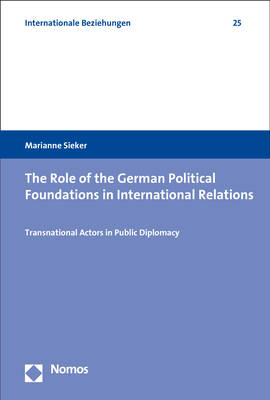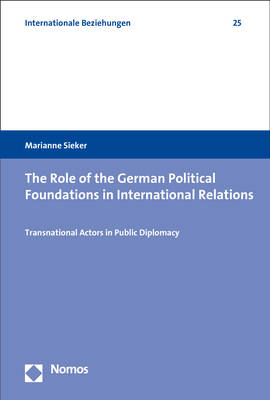
- Afhalen na 1 uur in een winkel met voorraad
- Gratis thuislevering in België vanaf € 30
- Ruim aanbod met 7 miljoen producten
- Afhalen na 1 uur in een winkel met voorraad
- Gratis thuislevering in België vanaf € 30
- Ruim aanbod met 7 miljoen producten
Zoeken
The Role of the German Political Foundations in International Relations
Transnational Actors in Public Diplomacy
Marianne Sieker
€ 69,95
+ 139 punten
Omschrijving
This study researches the international activities of German political foundations and their position within international relations theory. It juxtaposes the rationalist and constructivist approaches to the state and non-state relationship and the possible impact of transnational actors. The author uses a model of public diplomacy to systematically study the foundations' transnational interaction processes. She integrates different public diplomacy approaches and assumes that public diplomacy occurs in a network environment. The study explores the foundations' approaches to promoting democracy and managing conflict as collaborative or catalytic forms of public diplomacy. It conducts two case studies, one on the rule of law programme of the Konrad-Adenauer-Stiftung in Southeast Europe and another on the activities of the Friedrich-Ebert-Stiftung in Southern Thailand, by investigating those foundations' strategies of ideational diffusion processes and networking, their soft power resources and their approaches to forming social relationships.
Specificaties
Betrokkenen
- Auteur(s):
- Uitgeverij:
Inhoud
- Aantal bladzijden:
- 332
- Taal:
- Engels
- Reeks:
- Reeksnummer:
- nr. 25
Eigenschappen
- Productcode (EAN):
- 9783848745371
- Verschijningsdatum:
- 27/08/2019
- Uitvoering:
- Paperback
- Formaat:
- Trade paperback (VS)
- Afmetingen:
- 152 mm x 227 mm
- Gewicht:
- 349 g

Alleen bij Standaard Boekhandel
+ 139 punten op je klantenkaart van Standaard Boekhandel
Beoordelingen
We publiceren alleen reviews die voldoen aan de voorwaarden voor reviews. Bekijk onze voorwaarden voor reviews.











